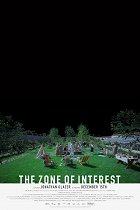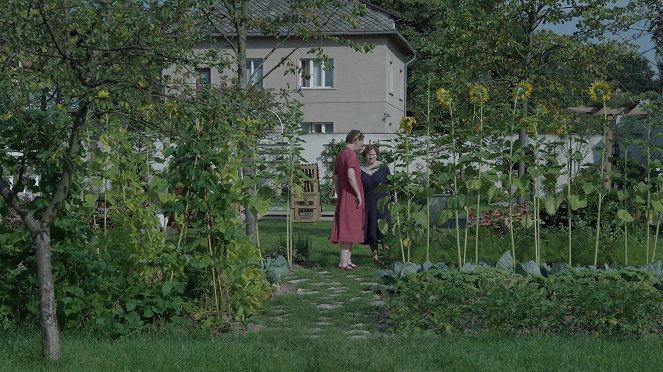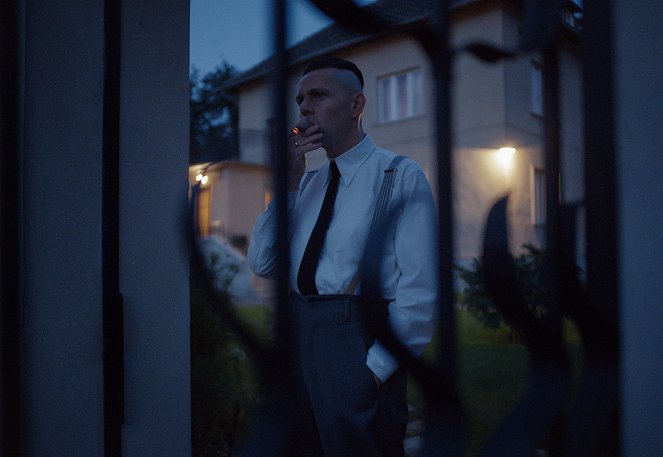Directed by:
Jonathan GlazerScreenplay:
Jonathan GlazerCinematography:
Łukasz ŻalComposer:
Mica LeviCast:
Sandra Hüller, Christian Friedel, Ralph Herforth, Freya Kreutzkam, Max Beck, Ralf Zillmann, Imogen Kogge, Stephanie Petrowitz, Marie Rosa Tietjen (more)VOD (4)
Plots(1)
The commandant of Auschwitz, Rudolf Höss, and his wife Hedwig, strive to build a dream life for their family in a house and garden next to the camp. (SF Studios Fin.)
Videos (4)
Reviews (10)
Jonathan Glazer is again powerfully creative and artsy. In The Zone of Interest, we don’t see a single Auschwitz prisoner in the film or any of the atrocities perpetrated behind the walls of the camp. The minimalistically staged but effectively arranged action takes place inside the Hösses’ villa and in their garden, which is bordered by the wall, over which the tops of the concentration-camp barracks loom. Höss dutifully goes to “work” and spends his free time with his family. Höss’s wife enjoys the flowers in the garden. Their children play by the swimming pool. Höss occasionally receives a visitor on business, such as engineers with a design for a more efficient crematorium. Sometimes someone brings them a bag of nice clothes to pick through... The whole time, we hear the distant droning of the death factory in operation, sometimes people screaming, dogs barking, gunfire. Black clouds of ash fill the sky. The Höss children’s perception of the world outside the house is also evident in small nuances. The little girl’s nocturnal dreams in black-and-white inverted images are the most impressive of the artistic ornaments with which the film is packed to the maximum satisfaction of the festival viewer. The scene with Höss on the stairs with the dark empty corridors is brilliant and the highlight of the film in my opinion. The Zone of Interest is a different view of the Holocaust, with the most unpleasant music you have ever experienced accompanying the closing credits. This puts Jonathan Glazer in the company of masters like Michael Haneke and Yorgos Lanthimos. [Cannes FF]
()
The Zone of Interest depicts the concentration camps and the Holocaust from a truly novel point of view, and this is why it will not be lost among the thematically close films. Jonathan Glazer's film does not primarily target the audience's eyes, but rather their ears and general awareness of the horrors of war: at first glance we see the ordinary life of an ordinary family, but on second viewing (or listening) and placing the film in the context of the time, it evokes extremely uncomfortable feelings. On the one hand we have an idyllic, almost 'Garden of Eden', on the other (behind the fence) we can hear screams and gunshots, while in the distance we watch the smoke (of death). To the sound of a sometimes literally poignant musical score, we witness that pure evil can take on a completely mundane, innocent form. As in Anatomy of a Fall, Sandra Hüller gives a supremely impressive performance and I'm curious to see what roles await her in the future. Last but not least, I praise the play with negative imagery, which contributed to the film's unpleasant atmosphere. Perhaps only the closing documentary insert left me with mixed feelings.
()
Such is the daily routine of a family of ordinary, decent citizens. They grow kohlrabi and carnations in the garden, keep the house in perfect order, pet the dog and frolic in the swimming pool, and all this is provided by the head of the family, who goes to work every day in an exemplary manner and who - by the way - is the director of the most monstrous concentration camp. He is, again by the way, at work dealing with, for example, the more efficient incineration of Jews in ovens, and does it with the same emotional involvement as when you and your wife are deciding what to buy for dinner at the supermarket. And behind the walls of this middle-class family's property, behind those ominous walls, is a human-scale Mordor where the most monstrous acts against humanity are taking place, and you feel an immense oppression thanks to the ingenious sound work and the ominous visual details in the distance, such as the smoke from the ovens, or from the locomotives bringing in more and more human fuel. The film doesn't shove down your throat horrific imagery about how monstrous the Holocaust is, it does it on a subliminal basis, working with your subconscious, and that actually makes it all the worse. It made me sick, but at the same time I bow down to Jonathan Glazer for this bold cinematic experiment that says more about us humans than you'd expect.
()
Though throughout most of the film we don’t see anything other than an outwardly ordinary German family, the layered soundtrack, which mixes the chirping of birds and the murmur of a river with a constant mechanical drone, evokes an almost indefinable feeling from the first minutes, a feeling that something intimately familiar seems strange and oppressive. The resulting effect is best described by the term “unheimlich” from Freud’s psychoanalysis, i.e. uncanny. Zone of Interest is extremely disturbing in its ability to capture the abnormality of the everyday. ___ The unchanging, rigid apathy of the depicted world is underscored by predominantly static shots without artificial lighting and with great depth of field. The cameras are positioned in different corners of the house and garden like in a reality TV show. They record the movements of the actors without artistic stylisation, thus evoking an impression of the distant past. Not even the editing adheres to the principles of standard narrative cinema. The switching between cameras depends on which room a character has just entered. Everything thus seemingly takes place in the present tense. Subjectivity and creativity, or rather the possibility of averting one’s gaze and disrupting the order of things, are suppressed. The tasks that Höss carries out are mindless administrative work. Genocide is a logistical process. ___ If we wanted to locate the source of the tension that pervades the whole film, it would be the clash between what the Hösses are willing to see and what happens outside of their house and garden. Glazer’s distinct style is a form of rejection. He consistently avoids aestheticizing one of the greatest tragedies of modern history. At the same time, he succeeds in using empty space in a way that is far more powerful than direct depiction. Because we cannot see the other side, we are aware of what is happening there. Our effort to fill this gap leads to the fact that we cannot stop thinking about the ongoing violence. ___ Glazer also included night scenes shot with a special thermal camera. This involves a reconstruction of the story of a ninety-year-old Polish woman named Alexandra, whom Glazer met during his research. She became for him a symbol of resistance, a light in the darkness. Taking into account the perspective of those who actively resisted Nazism is one of the few elements that Zone of Interest shares with more conventional dramas about the Holocaust. Where other Oscar-winning dramas offer catharsis and a reassurance that humanity will ultimately prevail, Zone of Interest offers only a disturbing presentiment of things to come. We see that the concentration camp has become a museum where cleaners mechanically vacuum the dust and polish the display cases. A single glance inside the death factory peculiarly does not reveal any atrocities. Rather, it is characterised by the same emotionless routine that we saw in the Hösses’ bourgeois household. We have become accustomed to the presence of the Holocaust in our collective memory and in the media space. Zone of Interest shines a light on the mundanity, banality and elusiveness of the evil to which we contribute merely by remaining indifferent. 90%
()
(less)
(more)
Zone of disinterest. One of those films that the teacher puts on in history class, but 80% of the students would rather pull out their cell phones and scroll through Instagram because it's almost as boring as regular class. The film is completely empty in terms of information, so it doesn't even serve an educational purpose. We follow the banalities of the daily life of a concentration camp commander and his family. We learn nothing about the characters, the dialogues are cut down to the minimum, Auschwitz is not shown, so again a film for book readers, where the viewer has to figure everything out (fck you!!), it has no script, the atmosphere doesn't work at all, there’s no build-up, no tension or escalated drama between the Nazis, the emotions below zero, and in the end, instead of showing a pile of corpses, they show only shoes. The film is so empty, slow and boring that even if you skips twenty minutes, you won’t miss anything crucial. Son of Saul was thematically similar, but somewhere else. An intimate arthouse of the highest order. 3/10.
()



Ads